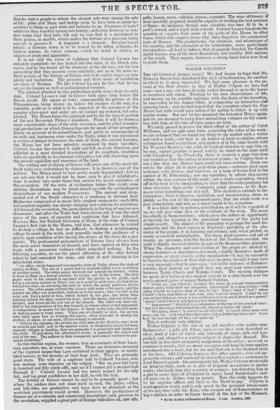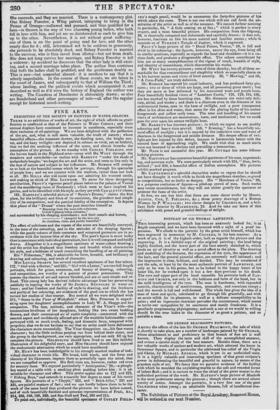fined periods of the history of Greece, but in its
earlier stages of sim- Tne old historical farrago again ! We had begun to hope that Mr. plieity and barbarism. The passions and their mode of exhibition HORACE SMITH had abandoned this style of bookmaking, for another are those of HOMER. We like Colonel LEAKE for this, that he has in which he is more successful. We had some pleasure in the p& an eye for human as well as archieological remains.. rusal of the New Forest : in that of Walter Colyton we have had cial productions on which Greece depends for much of her prosperity. We lately passed in review the latest effort of the author of Caleb Partly on account of its unhealthiness, and partly in consequence of Williams, and we split some hairs respecting the value of his work : its rude and barbarous state under the Turks, when it was considered we are ashamed that we found any thing tO say against such a writer a service of danger to traverse the state of Mani, the ancient Laconia, and such a book,—for here is an author of great reputation, svhosd the Morea has not been minutely examined by many travellers. writings are found everywhere, and spoken of in the same breath with Colonel LEAKE has tracked it right and left, in every direction, and Sir WALTER SCOTT'S,—he, with all kinds of stimulus to urge him On afforded us a most detailed description of its condition, doubtless his way, cannot produce a novel worthy to stand on the same shelf with an eye chiefly to its classical antiquities, but still observing upon with Cloudesley. In Cloudesley there is scarcely a page that does the present capability and resources of the land. not remind us that the author is a man of genius : in Colyton there is . The settling and civilizing of Greece will prove one of the most dif- not a line that any literary hack could not have written. From one ficult tasks ever undertaken by statesmen : it is, however, one of the end to the other all is most pedestrian prose,—sentence piled upon noblest. The Morea must be now pretty nearly depopulated ; but we sentence, cold, lifeless, and tasteless, as a heap of frozen fruit in the are not sure that it would not be more easy to give it inhabitants, market of St. Petersburg ; not one sparkling or salient idea occurs than to reduce into order those that survive the severe calamities of within the four corners of the work ; not a single conception, struck the revolution. Of the state of civilization before this event, some off in the heat of the imagination, to show that the writerproduces his striking illustrations may be found mixed up with the archieolos,rical ideas otherwise than as the Calmucks grind prayers, or. Mr. BAB- disquisitions of our modem PAUSANIAS. The ancient and deep- BAGE turns logarithms out of a mill. This dreariness extends to the rooted evil of the Greek character is a tendency to internal feud. characters : their feebleness, vacillation, and inconsistency, show, as Hellas was composed of so many little virtdent wasp-nests : each little plainly as the rest of the component parts, that the whole work is a independent republic was always stinging and worrying its neighbour. pure compilation, and not, as a novel ought to be, a creation. All through the revolution, the great obstacle in the way of success was It is a frisk duty to perform, nevertheless, as it will be expected of dissension ; and after the Turks had been driven out, it was the chief us, we will give some idea of the conduct of the story. The scene cause of the years of anarchy and confusion that have followed. lies chiefly in Somersetshire ; which gives the author an opportunity HASSAN BEY, the Turkish Governor of Mani, at the time of Colonel, of showing his learning in the provincial tongue of this pretty but LEAKE'S fiiSt visit to the Morea, told him, that whenever he wished stupid county. The dialect of the peasantry is perhaps the most dis- to destroy a village, he had no difficulty in finding a neighbouring agreeable and the least curious in England s partaking of the cha- village to assist in the work, and generally under the guidance of a racter of the people, it is drawling and clumsy, and, when printed, as priest, upon condition of his having the stones of the ruins for a per- • nearly as possible unintelligible. For these good reasons, and out of quisite. The professional peacemakers of Greece have always been rivalry, we presume, with the Scotch of the Northern novelist, the the most active fomenters of discord, and have carried on their own work is thickly strewed with the jargon of the Somersetshire peasants. feuds with a rancorous violence which respected nothing. In the When the character and conversation of the people are marked by following anecdote, we see the priest officiating at the altar behind strong features—a shrewdness of remark, a highly figurative mode of
She succeeds, and they are married. There is a contemporary plot. One Sidney Forester, a Whig patriot, intriguing to bring in the Prince of Orange—outlawed and pursued, and thus qualified for a hero—is thrown in the way of two charming young ladies, who both fall in love with him, and yet are so disinterested as each to give him up to the other. Nevertheless, it is not without great suffering: one of them is on the point of going mad for love, and the other nearly dies for it ; still, determined not to be outdone in generosity, she pretends to be absolutely dead, and Sidney Forester is married to the survivor, who is thus saved from idiotcy—but not from death. She does not long survive her marriage, and Sidney Forester is left a widower: by accident he discovers that the other lady is still exist- ing, and a second marriage takes place. The author thus contrives that both the ladies shall be gratified, and the gentleman doubly so. This is new—but somewhat absurd : it is needless to say that it is utterly improbable. In the course of these events, we are taken to the court of James, and subsequently to that of William the Third ; whose landing, and the political events which accompanied it, are described as well as if it were the history of England the author was writing. The Countess of Dorchester is elaborately drawn ; so also are Sunderland and other personages of note—all after the regular receipt for historical novel-writing.



















 Previous page
Previous page